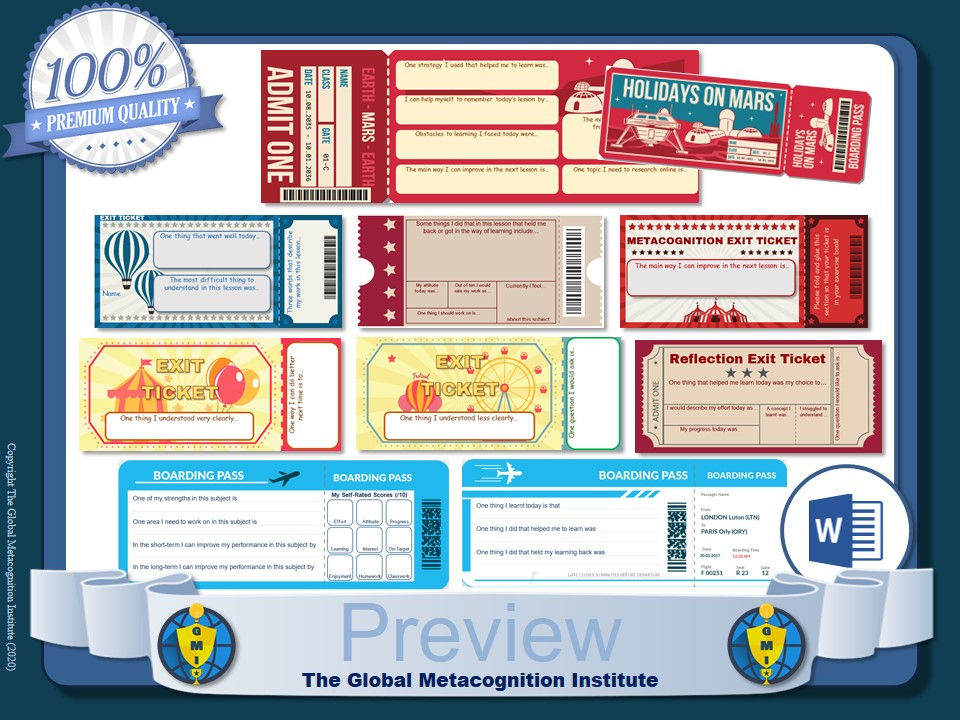This article is aimed at educators and educational leaders who already know what mind-mapping is and what metacognition is; the purpose of this article is to offer advice and ideas as to how mind-mapping activities can be used to enhance metacognition and how to combine efforts in training mind-mapping skills with efforts to boost metacognition in students. Resources to enact some of these strategies can be downloaded here or accessed in the Member's Area by those with full-membership to The Global Metacognition Institute.
Three Ways to Use Mind-Maps to Enhance Metacognition
The following ideas are designed to simultaneously train mind-mapping skills and develop metacognitive reflection, monitoring, and knowledge.
1. Have students use mind-maps to explore metacognition reflection questions/rubrics Examples of questions/rubrics for general metacognitive reflection:
"Create a mind-map showing your strengths and weaknesses as a learner."
"Create a mind-map showing your current targets in this subject and what you need to do in order to meet them."
"Create a mind-map outlining skills a student can develop in order to become a more effective learner."
"What are the most effective approaches to revision?" - Express your ideas in the form of a mind-map
"What obstacles do you currently face in this subject and how might you overcome them?" - Express your ideas in the form of a mind-map
[At the end of a lesson] "Create a mind-map showing the main learning-points from today's lesson: indicate how secure your understanding is for each topics" [this fosters Metacognitive Monitoring]
2. Use mind-maps to Improve Metacognition in Relation to Assessments
In the context of practice exam questions and practice exam papers, mind-maps can be an ideal way to explore the requirements of a given assessment before students engage with it. For example, many exam papers have larger, essay-style, questions: it is useful to have students create a quick mind-map showing 'the kinds of thing a perfect answer would include'.
Students should identify obstacles and state targets and "areas I need to improve on" (based on previous assessments) in their mind-maps: thus adding a deeper level of metacognition to the process.
Alternatively you may wish to use mind-maps to create a make-shift 'Exam Wrapper' whereby students are lead to reflect on how they have prepared for the assessment, how they may have prepared more effectively, and what revision tasks could have helped them be more prepared.
Once students have created a basic outline of what a high-mark question should include, it can be useful to then have them plan a perfect answer, using the mind-map they have just created as a foundation. You can even use student feed-back to plan a model answer on the board - an especially useful approach if working with students who are new to the course and have had too little practice with such questions.
Having done this students are in a good place to attempt an assessment question. Alternatively, in a revision session a teacher might provide students with a series of essay titles, giving them five-minutes (perhaps working in groups) to plan model answers for all questions.
3. Using Mind-Maps with Videos Relevant to Metacognitive Development Show students videos about metacognition, pedagogy and factors influencing learning-power and have them use mind-maps to capture as much information as they can. It can be useful to provide students with a printed mind-map template for such a task, especially if they are new to mind-mapping: in such a case you might even get them to make a mind-map responding to a video about mind-mapping! Take this one for example...
With this approach it is a good idea to get students to connect the idea in their mind-map to their own learning journeys. For example, if your students have watched a video about 'How to Improve Memory' they may wish to generate a couple of targets as to how they could mos effectively improve their own memory; this way you turn a simple mind-mapping/note-taking task into a metacognitive regulation exercise.
Important Resources & Downloads
Download our mind-mapping skills teaching resource: The Power of Mind-Maps. It includes ten resources and is a comprehensive and definitive way to teach mind-mapping skills whilst fostering metacognitive development with students aged 11-18, those ten resources are:
Introducing Mind-Maps
Introduction, Applications & Benefits of Mind-Maps
Mind-Map Reading Comprehension Templates (x10)
Mind-Map Worksheets to Use With Long Documentaries
The Mind-Map Challenge
Mind-Maps for Brainstorming & Group Work (P4C Related)
Video Learning Session [Videos About Mind-Mapping & A3 Worksheets (x3)]
Generic Mind-Map Practice Templates (x4)
Using Mind-Maps for Speed Reading & Fast Note-Taking
Mind-Maps for Personal Reflection & DIRT (A3 & A4 Worksheets)
As you can see, this collection of mind-mapping practice activities also connects with broader metacognitive and learning-power skills and development. Download today to help teach this important metacognitive skill to your students!
You might also be interested in ordering this resource as a part of a broader study-skills development package, saving money by getting multiple resources in this bundle...

All our downloads include a whole-school license for up to fifty users: that means you can share it with teachers within your school for no additional cost!





































































Commentaires